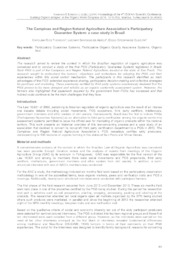The Campinas and Region Natural Agriculture Association-s Participatory Guarantee System: a case study in Brazil.
The Campinas and Region Natural Agriculture Association-s Participatory Guarantee System: a case study in Brazil.
Author(s): THOMSON, C. R.; ABREU, L. S. de; OLIVEIRA, D. G.
Summary: Abstract: The research aimed to review the context in which the Brazilian regulation of organic agriculture was conceived and to conduct a study of the first PGS (Participatory Guarantee System) registered in Brazil. Such PGS is part of the Campinas and Region Natural Agriculture, located in the state of San Paolo. The research sought to understand the farmers´ objectives and motivations for adopting the PGS and their experiences within this social control mechanism. The participants in this research identified as main advantages of the PGS: extended experience sharing, participatory decision-making and collective strategies for purchase and marketing. Those previously certified by third party systems unanimously declared that the PGS proved to be more stringent and reliable as an organic conformity assessment system. However, the farmers also highlighted that paperwork required by the government from PGSs has increased and that indirect costs continue to be the main challenges that they face.
Publication year: 2014
Types of publication: Paper in annals and proceedings
Unit: Embrapa Environment
Observation
Some of Embrapa's publications are published as ePub files. To read them, use or download one of the following free software options to your computer or mobile device. Android: Google Play Books; IOS: iBooks; Windows and Linux: Calibre.
Access other publications
Access the Agricultural Research Database (BDPA) to consult Embrapa's full library collection and records.
Visit Embrapa Bookstore to purchase books and other publications sold by Embrapa.

